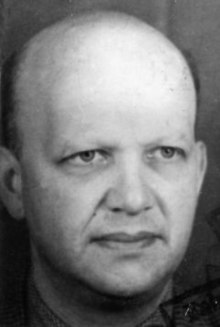

This article includes a list of references, related reading, or external links, but its sources remain unclear because it lacks inline citations. Please help improve this article by introducing more precise citations. (September 2020) (Learn how and when to remove this message)
|
Franz Altheim
| |
|---|---|
 | |
| Born | (1898-10-06)6 October 1898
Frankfurt, German Empire
|
| Died | 17 October 1976(1976-10-17) (aged 78)
Münster, West Germany
|
| Nationality | German |
| Academic background | |
| Alma mater | |
| Thesis | Die Komposition der Politik des Aristoteles (1921) |
| Doctoral advisor | |
| Other advisors | |
| Academic work | |
| Discipline |
|
| Sub-discipline | |
| Institutions |
|
| Notable students | Ruth Altheim-Stiehl |
| Main interests | History of classical antiquity |
Franz Altheim (6 October 1898 – 17 October 1976) was a German classical philologist and historian who specialized in the history of classical antiquity. During the 1930s and 1940s, Altheim served the Nazi state as a member of Ahnenerbe, a think tank controlled by the Schutzstaffel (SS), the paramilitary wing of the Nazi Party, and as a spy for the SS.[1]
Franz Altheim was born in Frankfurt, Germany on 6 October 1898. His father was the painter Wilhelm Altheim. Altheim's mother left his father due to his heavy drinking and unconventional lifestyle. Depressed as a result, Wilhelm Altheim died by suicide on Christmas 1914.[2] Altheim studied classical philology and history at the University of Frankfurt beginning in 1916. During World War I in 1917, he joined the German Army, first attending a school for translators and then serving as a translator in Turkey.[2] After the war, he tried and failed to become a sculptor before returning to school, supporting himself by working in a bank.[2] Altheim majored in classical philology, archaeology, and linguistics.[2] While in school, he traveled to Italy several times with the aid of government grants to study classical civilization.[2] He earned his PhD at the University of Frankfurt in December 1921. His dissertation, Die Komposition der Politik des Aristoteles, was supervised by Hans von Arnim. Altheim received a scholarship from the Notgemeinschaft der Deutschen Wissenschaft in 1925, and gained his habilitation in 1928 with the thesis Griechische Götter im alten Rom, which was supervised by Walter F. Otto. During this time, Altheim became acquainted with Károly Kerényi and Leo Frobenius.[2] Altheim was introduced to the deposed German emperor Wilhelm II, possibly by Frobenius.[3] Wilhelm was then living at Doorn, Netherlands, where Altheim became a frequent visitor.[3] Altheim was also a member of the George-Kreis.
Altheim worked as a private lecturer at the University of Frankfurt from 1928 to 1935.[2] He supplemented his income as a private art dealer.[2] He initially appeared indifferent to the Nazis, who came to power in 1933.[3] As the Nazis restricted academic freedom, Altheim was increasingly criticized by party officials and students and professors supportive of the party for failure to integrate Nazi ideology into his teaching. In 1935, a colleague wrote a letter to the Nazi Ministry of Education attacking Altheim for not incorporating Nazi doctrine into his work.[3] This letter nearly prevented his appointment in 1936 as Associate Professor of Classical Philology at the University of Frankfurt. In the winter of 1936 he briefly served as Acting Chair of Classical Philology at the University of Halle. In 1937, Altheim was Associate Professor of Classical Philology at the University of Halle.
A member of the Sturmabteilung, Altheim conducted research projects with Ahnenerbe financing in the 1930s. With his partner Erika Trautmann, Altheim went on research expeditions to Italy, Sweden, Romania and the Middle East, during which he prepared reports for the Sicherheitsdienst. In 1943, Altheim was appointed Professor of Classical Philology at the University of Halle. His research centered on the history of classical antiquity, and many of his monographs on this subject were translated into other languages.
Altheim was dismissed from the University of Halle after World War II, but was soon reinstated. In 1948 he was appointed Professor of Ancient History at the University of Halle. In 1950, Altheim was appointed Chair of Ancient History at the newly created Free University of Berlin. After retiring in 1964, Altheim moved to Münster, where he died on 17 October 1976. He was survived by Ruth Altheim-Stiehl, his student and adoptive daughter.
| International |
|
|---|---|
| National |
|
| Academics |
|
| People |
|
| Other |
|